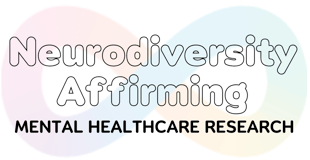
Neurodiversity Affirming Mental Health Care Research
Background and Rationale:
Neurodivergent adults, specifically autistic individuals and attention deficit hyperactivity (ADHD) individuals, face significant challenges in accessing and participating in mental health care services, leading to high rates of unmet mental health care needs and an increased risk of suicide (Adams & Young, 2020; Australian Institute of Health and Welfare, 2018). Existing mental healthcare practices and experience measures may inadequately capture and address the nuanced experiences, needs, and preferences of neurodivergent adults (Jones, 2022). This gap in understanding the complexity of lived experience may result in inadequate provision of care, reduced therapeutic alliance, increased unmet mental healthcare needs and poorer overall mental health outcomes for the neurodivergent adult population (Arnold et al., 2024; Cage et al., 2018; Jubenville-Wood et al., 2023; Mills, 2023).
Nuanced aspects of mental health care experiences encompass subtle, complex, or easily overlooked factors or factors that may not be immediately apparent or addressed in standard mental health care practices, that can significantly impact the quality and effectiveness of care. When examining research and clinical practice experiences, the emphasis tends to be on investigating experiences based on neuronormative or widely recognised or stereotypical neurodivergent traits. Examining experience through a potentially inadequate or irrelevant lens may overlook the diversity of lived experiences among neurodivergent adults. This oversight may hinder a comprehensive understanding and improvement of mental healthcare accessibility for this population (Curnow et al., 2023; Jones, 2022). Therefore, the primary goal of this research is to identify and address these nuanced aspects, aiming to capture a more complete picture of neurodivergent adult experiences in mental healthcare settings. This approach is expected to uncover a broader range of experiences, preferences, and needs that matter to neurodivergent adults that may have previously been unrecognised or underexplored.
This research project will centre neurodivergent voices using a comprehensive, participatory approach to investigate the experiences, needs, and preferences of neurodivergent adults in mental health care settings. The study aims to construct a nuanced understanding of these diverse experiences by employing a large-scale international online qualitative survey.
Acquiring this comprehensive understanding will inform the evaluation of existing patient-reported experience measures. If current measures are found inadequate, the project will develop a tailored patient-reported experience instrument for neurodivergent adults, along with a corresponding implementation framework.
Therefore, this research is a fundamental step in generating a strong evidence base to develop recommendations for neurodiversity-affirming care to enhance the accessibility, effectiveness, and inclusivity of mental healthcare services for neurodivergent adults.
Ultimately, this research endeavours to reduce mental health disparities, improve mental health support experiences and outcomes, by setting a comprehensive lived experience informed standard for neurodiversity-affirming care in mental healthcare research and practice.
Research Outcomes:
1. Identification of Key Experience Domains: This research will identify nuanced aspects of mental healthcare experiences that matter to neurodivergent adults. This foundational knowledge will inform the subsequent development of service delivery recommendations aimed at improving mental healthcare service accessibility.
2. Development of a Validated Measure: If existing measures prove inadequate, further research will be undertaken to develop a comprehensive, psychometrically sound patient-reported experience measure tailored for neurodivergent adults. This instrument will address the potential gap in service delivery, enabling a more accurate evaluation of service quality and experience. This is essential as research has found that positive patient reported experiences are linked to better mental healthcare outcomes (Fernandes et al., 2020; Kingsley & Patel, 2017; Lai et al., 2020).
3. Environmental and Therapeutic Insights: Research findings are expected to inform best practice recommendations for therapeutic environments, processes, and practices tailored to individual neurodivergent clients, informed by neurodivergent adults.
These recommendations aim to establish a sense of safety, trust and rapport while enhancing accessibility, comfort, and engagement. Furthermore, this research may provide deeper insights into factors contributing to strong therapeutic alliance, which is a reliable predictor of positive clinical outcomes (Ardito & Rabellino, 2011). This is essential as therapeutic alliance has been found to be a significant determinant of support success, independent of the specific therapeutic modality used (Fisher et al., 2016).
4. Accessibility and Support Modalities: This research may potentially identify barriers and facilitators to access and preferences for support delivery methods, including remote options, which will inform the development of more flexible and accommodating service models.
Research Impacts:
1. Enhanced Accessibility:
This research may contribute to the development of evidence-based, tailored resources and materials for client-practitioner collaboration, taking a shared decision-making approach to maximise the individual's potential, minimise access and participation barriers, and optimise the person-environment fit.
2. Improved Care Quality:
Practitioners have reported insufficient information and resources to meet the needs of neurodivergent clients (Mills, 2023; Mitran, 2022). The findings and outcomes of this research may equip practitioners with improved understanding and resources to provide effective and practical neurodivergent-affirming care. Furthermore, these resources aim to enhance practitioners' knowledge and understanding of neurodivergent clients' experiences, needs, and preferences, potentially reducing the occurrence of relational ruptures in therapeutic settings (Hume, 2022; Lai, 2023; Lai et al., 2020; Mills, 2023). This is anticipated to significantly improve the quality and accessibility of mental healthcare for neurodivergent individuals.
3. Empowerment and Self-Advocacy:
The identification or development of a tool and process that reflects the domains important to the neurodivergent adult population could enable confident and effective articulation of individual needs, preferences, and experiences.
Additionally, it would provide practitioners with expanded insights into neurodivergent perspectives. The need for such a tool is evident as research has found that neurodivergent adults often feel misunderstood by mental health practitioners and struggle with services not tailored to their individual needs (Crane et al., 2019; Hume, 2022). Furthermore, practitioners recognise the importance of building trust with neurodivergent clients and advocate for resources supporting inclusive communication (Chapman & Botha, 2023; Mills, 2023; Mitran, 2022).
By fostering a collaborative and responsive approach to mental healthcare, this proposed instrument aims to empower neurodivergent clients, enhance practitioners' ability to provide appropriate support, and ultimately improve the accessibility and quality of mental health services for the neurodivergent population.
Get Involved
Get involved in shaping this important research.
Stay Informed






Stay inform by registering for our quarterly email newsletter to receive the latest updates and insights from our research.
Expression of Interest to Participate in Research
Neurodivergent adults interested in sharing their perspectives to help shape more inclusive mental health support are invited to register their expression of interest to receive emails about potential opportunities to co-design and participate in our research studies.
Application for Community Advisor Board Member
We welcome neurodivergent individuals to express interest in joining our advisory panel, where your lived experiences and insights will directly guide the direction and implementation of this vital research.
References
Adams, D., & Young, K. (2020). A systematic review of the perceived barriers and facilitators to accessing psychological treatment for mental health problems in individuals on the autism spectrum. Review Journal of Autism and Developmental Disorders, 8(4), 436-453. https://doi.org/10.1007/s40489-020-00226-
Ardito, R. B., & Rabellino, D. (2011). Therapeutic alliance and outcome of psychotherapy: Hstorical excursus, measurements, and prospects for research. Frontiers in Psychology, 2, 270. https://doi.org/10.3389/fpsyg.2011.00270
Arnold, S. R., Bruce, G., Weise, J., Mills, C. J., Trollor, J. N., & Coxon, K. (2024). Barriers to healthcare for Australian autistic adults. Autism, 28(2), 301-315. https://doi.org/10.1177/13623613231168444
Australian Institute of Health and Welfare. (2018). Suicide & self-harm monitoring: Deaths by suicide among people who used disability services. Commonwealth of Australia. https://www.aihw.gov.au/suicide-self-harm-monitoring/data/populations-age-groups/deaths-by-suicide-among-people-who-used-disability
Cage, E., Di Monaco, J., & Newell, V. (2018). Experiences of autism acceptance and mental health in autistic adults. Journal of Autism and Developmental Disorders, 48(2), 473-484. https://doi.org/10.1007/s10803-017-3342-7
Chapman, R., & Botha, M. (2023). Neurodivergence-informed therapy. Developmental Medicine and Child Neurology, 65(3), 310-317. https://doi.org/10.1111/dmcn.15384
Curnow, E., Rutherford, M., Maciver, D., Johnston, L., Prior, S., Boilson, M., Shah, P., Jenkins, N., & Meff, T. (2023). Mental health in autistic adults: A rapid review of prevalence of psychiatric disorders and umbrella review of the effectiveness of interventions within a neurodiversity informed perspective. PloS one, 18(7), e0288275.
Crane, L., Adams, F., Harper, G., Welch, J., & Pellicano, E. (2019). 'Something needs to change': Mental health experiences of young autistic adults in England. Autism, 23(2), 477-493. https://doi.org/10.1177/1362361318757048
Fernandes, S., Fond, G., Zendjidjian, X. Y., Baumstarck, K., Lançon, C., Berna, F., Schurhoff, F., Aouizerate, B., Henry, C., Etain, B., Samalin, L., Leboyer, M., Llorca, P. M., Coldefy, M., Auquier, P., & Boyer, L. (2020). Measuring the patient experience of mental health care: A systematic and critical review of patient-reported experience measures. Patient Preference and Adherence, 14, 2147-2161. https://doi.org/10.2147/ppa.S255264
Fisher, H., Atzil-Slonim, D., Bar‐Kalifa, E., Rafaeli, E., & Peri, T. (2016). Emotional Experience and Alliance Contribute to Therapeutic Change in Psychodynamic Therapy. Psychotherapy, 53(1), 105-116. https://doi.org/10.1037/pst0000041
Jones S. C. (2022). Measuring the wrong thing the right way? Time to rethink autism research tools. Autism in Adulthood: Challenges and Management, 4(2), 104–109. https://doi.org/10.1089/aut.2021.005
Hume, R. (2022). Show me the real you: Enhanced expression of rogerian conditions in therapeutic relationship building with autistic adults. Autism in Adulthood, 4(2), 151-163. https://doi.org/10.1089/aut.2021.0065
Jubenville-Wood, T., Nicholas, D. B., Weiss, J., & Cairns, S. (2023). Facilitators and barriers in psychotherapy from the perspective of autistic adults: an enhanced critical incident study. International Journal of Qualitative Studies on Health and Well-being, 18(1), 2278858. https://doi.org/10.1080/17482631.2023.2278858
Kingsley, C., & Patel, S. (2017). Patient-reported outcome measures and patient-reported experience measures. BJA Education, 17(4), 137-144. https://doi.org/10.1093/bjaed/mkw060
Lai, M.C. (2023). Mental health challenges faced by autistic people. Nature Human Behaviour, 7(10), 1620-1637. https://doi.org/10.1038/s41562-023-01718-2
Lai, M. C., Anagnostou, E., Wiznitzer, M., Allison, C., & Baron-Cohen, S. (2020). Evidence-based support for autistic people across the lifespan: maximising potential, minimising barriers, and optimising the person-environment fit. The Lancet Neurology, 19(5), 434-451. https://doi.org/10.1016/s1474-4422(20)30034-x
Mills, D. (2023). Applying a neurodiversity affirmative approach to the pluralistic framework. Counselling and Psychotherapy Research, 23(3), 627-637. https://doi.org/https://doi.org/10.1002/capr.12637
Mitran, C. (2022). Challenges of licensed counselors and other licensed mental health providers working with neurodiverse adults: An instrumental case study. The Family Journal, 31, 357-366. https://doi.org/10.1177/10664807221123553
